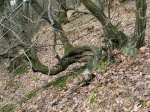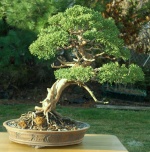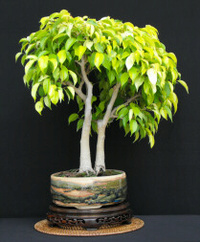Several questions "WHY?" "WHAT?" or "HOW?" mostly about basic things in bonsai growing.
+2
Vlad
JanG.
6 posters
Page 1 of 1
 Several questions "WHY?" "WHAT?" or "HOW?" mostly about basic things in bonsai growing.
Several questions "WHY?" "WHAT?" or "HOW?" mostly about basic things in bonsai growing.
Hello everybody,
while I am searchong for more informations about growing and caring for different tree spieces, I came across several things that are not clear for me. So I have some WHY? WHAT? and How? questions. Could you help me with these by giving me your opinions or telling me about your experiences with following issues?
Here are some first:
1) By some spieces there is not recommended to bare-root while repottnting (Larch, Cotoneaster). In my short experience I know that bare-rooting could cause some issues, however „everybody“ says not to do it while „everybody“ does it. Why?
I know that it could be important for training good root system (if not for growing good nebari).
So as I can see, it is necessary to bare-root while repotting because you just need to check it.
2) I have no experience with wiring so far, but I heard that when you want to remove the wire from brunches, you should not untie it, but remove it by cliping. Why?
3) How is it with roots care when you grow a bonsai forest? Because I saw that when you grow forest penjing, you want to achieve solid mass of soil and roots that holds trees together.
So I think you just can not replant it or take care for roots to create nebari or so.
Thank you,
and if somebody also have some similar basic question, lets put it here as well and talk about it.
while I am searchong for more informations about growing and caring for different tree spieces, I came across several things that are not clear for me. So I have some WHY? WHAT? and How? questions. Could you help me with these by giving me your opinions or telling me about your experiences with following issues?
Here are some first:
1) By some spieces there is not recommended to bare-root while repottnting (Larch, Cotoneaster). In my short experience I know that bare-rooting could cause some issues, however „everybody“ says not to do it while „everybody“ does it. Why?
I know that it could be important for training good root system (if not for growing good nebari).
So as I can see, it is necessary to bare-root while repotting because you just need to check it.
2) I have no experience with wiring so far, but I heard that when you want to remove the wire from brunches, you should not untie it, but remove it by cliping. Why?
3) How is it with roots care when you grow a bonsai forest? Because I saw that when you grow forest penjing, you want to achieve solid mass of soil and roots that holds trees together.
So I think you just can not replant it or take care for roots to create nebari or so.
Thank you,
and if somebody also have some similar basic question, lets put it here as well and talk about it.

JanG.- Member
 Re: Several questions "WHY?" "WHAT?" or "HOW?" mostly about basic things in bonsai growing.
Re: Several questions "WHY?" "WHAT?" or "HOW?" mostly about basic things in bonsai growing.
Great questions! ...If they are asked in the early winter time though  It will take a lot of time to answer it properly and spring is for most of us a bit busy. And at the end there is anything like a single correct way to do it. At least when it comes to repoting.
It will take a lot of time to answer it properly and spring is for most of us a bit busy. And at the end there is anything like a single correct way to do it. At least when it comes to repoting.
My approach is very close to methods described by Graham Potter.
https://www.kaizenbonsai.com/bonsai-tree-care-information/graham-s-guide-to-repotting-bonsai#How_to_re-pot_bonsai_trees
Re wire
Aluminium - no problem to unwire and reuse the wire again. The reason to cut it - if the wire bites too deep into the cambium then it is safer to cut it otherwise you may damage the branch
Copper - due to is characteristics it depends...
Re - forest
I suggest to contact Mimo. He is quite good on that.
My approach is very close to methods described by Graham Potter.
https://www.kaizenbonsai.com/bonsai-tree-care-information/graham-s-guide-to-repotting-bonsai#How_to_re-pot_bonsai_trees
Re wire
Aluminium - no problem to unwire and reuse the wire again. The reason to cut it - if the wire bites too deep into the cambium then it is safer to cut it otherwise you may damage the branch
Copper - due to is characteristics it depends...
Re - forest
I suggest to contact Mimo. He is quite good on that.

Vlad- Member
 Re: Several questions "WHY?" "WHAT?" or "HOW?" mostly about basic things in bonsai growing.
Re: Several questions "WHY?" "WHAT?" or "HOW?" mostly about basic things in bonsai growing.
JanG. wrote:Hello everybody,
while I am searchong for more informations about growing and caring for different tree spieces, I came across several things that are not clear for me. So I have some WHY? WHAT? and How? questions. Could you help me with these by giving me your opinions or telling me about your experiences with following issues?
Here are some first:
1) By some spieces there is not recommended to bare-root while repottnting (Larch, Cotoneaster). In my short experience I know that bare-rooting could cause some issues, however „everybody“ says not to do it while „everybody“ does it. Why?
I know that it could be important for training good root system (if not for growing good nebari).
So as I can see, it is necessary to bare-root while repotting because you just need to check it.
2) I have no experience with wiring so far, but I heard that when you want to remove the wire from brunches, you should not untie it, but remove it by cliping. Why?
It is better to unwind the wire as opposed to cutting it off. Cutting it off can and does cause damage to the bark on the tree if you are not extremely careful.
3) How is it with roots care when you grow a bonsai forest? Because I saw that when you grow forest penjing, you want to achieve solid mass of soil and roots that holds trees together.
So I think you just can not replant it or take care for roots to create nebari or so.
Sorry your question does not translate well and is not clear enough for an answer.
Thank you,
and if somebody also have some similar basic question, lets put it here as well and talk about it.

Vance Wood- Member
 Re: Several questions "WHY?" "WHAT?" or "HOW?" mostly about basic things in bonsai growing.
Re: Several questions "WHY?" "WHAT?" or "HOW?" mostly about basic things in bonsai growing.
also in regards to wire removal, and perhaps most importantly:
You spent ALOT of time putting that wire on... You then took ALOT of care in bending and placing the branches, during which you did internal damage to the tissue, which the tree then expends ALOT of time and energy healing, resulting in the branch staying where you placed it (usually).
After all that, why would you want to start bending that branch all over the place, re-injuring healed tissue, just to get 27 cents worth of wire off to re-use ?
Wire removal should be as therapeutic and relaxing as wire application...
the sound of a good pair of wire cutters *nuck nuck nuck* is one of my favorite sounds
You spent ALOT of time putting that wire on... You then took ALOT of care in bending and placing the branches, during which you did internal damage to the tissue, which the tree then expends ALOT of time and energy healing, resulting in the branch staying where you placed it (usually).
After all that, why would you want to start bending that branch all over the place, re-injuring healed tissue, just to get 27 cents worth of wire off to re-use ?
Wire removal should be as therapeutic and relaxing as wire application...
the sound of a good pair of wire cutters *nuck nuck nuck* is one of my favorite sounds

Kevin S - Wisco Bonsai- Member
 Re: Several questions "WHY?" "WHAT?" or "HOW?" mostly about basic things in bonsai growing.
Re: Several questions "WHY?" "WHAT?" or "HOW?" mostly about basic things in bonsai growing.
Vlad wrote: ... And at the end there is anything like a single correct way to do it. At least when it comes to repoting.
Kevin S - Wisco Bonsai wrote:also in regards to wire removal, and perhaps most importantly:
the sound of a good pair of wire cutters *nuck nuck nuck* is one of my favorite sounds
Right. Kevin's post confirmed that the wiring is in the same category as repoting.
Enjoy

Vlad- Member
 Re: Several questions "WHY?" "WHAT?" or "HOW?" mostly about basic things in bonsai growing.
Re: Several questions "WHY?" "WHAT?" or "HOW?" mostly about basic things in bonsai growing.
Guys, thank you very much, 
I think I understand.
Last weekend I was making some possibly starting bonsai trees from gardening nursery saplings. Before I started I thought that I will make some wiring, but actually there was nothing to wire (I bought some buxwood and two types of cotoneaster). Maybe next year (if the saplings will survive after what I have done with them
(I bought some buxwood and two types of cotoneaster). Maybe next year (if the saplings will survive after what I have done with them  ) So I am looking forward it.
) So I am looking forward it.
Now I have another question - this time about alkalic soil compounds and alkalic things around roots in general (I will explain).
Actually I am thinking about it from time to time and I am confused from the informations I have found.
I think that most of siol compounds are acidic or neutral PH. But what if I use marble or limestone? For example in aquaristics limestone should not be used as decoration because it hardens the water too much. However I bought some white crystallic look like grit for aquaristics, which I thought could be silica. But because I had doubts, I was serching for a way how to find out what it is. So finally I made scratch test by copper wire and found out that it is definetely marble. So what do you think? Could it be used as a compound in a soil? In fact it shouldn't dissolve rapidly, so it could only lightly modify soil PH and for plants that can handle calcareous soil it could be OK (so NOT OK for camellia, but OK for buxwood). But why nobody use it?
Now maybe more interesting question,
if alkalic compounds are not good for the plants (but maybe it is a question of a balance), why people make bonsai pots from cement or concrete? I was trying to find what PH the concrete has and in fact it is very alkalic (there was some article about dams, how does concrete effect surrounding soil and with some ways of concrete weathering description...). So it seems to be very bad idea. Is it really OK?
And the last thing - because limestone or concrete can effect plant the most when the roots touch its surface (for example concrete has capsules with saturated solution of water and OH- ), is it safe to use limestone when you want to grow roots over the rock?
Thank you in advance
I think I understand.
Last weekend I was making some possibly starting bonsai trees from gardening nursery saplings. Before I started I thought that I will make some wiring, but actually there was nothing to wire
Now I have another question - this time about alkalic soil compounds and alkalic things around roots in general (I will explain).
Actually I am thinking about it from time to time and I am confused from the informations I have found.
I think that most of siol compounds are acidic or neutral PH. But what if I use marble or limestone? For example in aquaristics limestone should not be used as decoration because it hardens the water too much. However I bought some white crystallic look like grit for aquaristics, which I thought could be silica. But because I had doubts, I was serching for a way how to find out what it is. So finally I made scratch test by copper wire and found out that it is definetely marble. So what do you think? Could it be used as a compound in a soil? In fact it shouldn't dissolve rapidly, so it could only lightly modify soil PH and for plants that can handle calcareous soil it could be OK (so NOT OK for camellia, but OK for buxwood). But why nobody use it?
Now maybe more interesting question,
if alkalic compounds are not good for the plants (but maybe it is a question of a balance), why people make bonsai pots from cement or concrete? I was trying to find what PH the concrete has and in fact it is very alkalic (there was some article about dams, how does concrete effect surrounding soil and with some ways of concrete weathering description...). So it seems to be very bad idea. Is it really OK?
And the last thing - because limestone or concrete can effect plant the most when the roots touch its surface (for example concrete has capsules with saturated solution of water and OH- ), is it safe to use limestone when you want to grow roots over the rock?
Thank you in advance

JanG.- Member
 Re: Several questions "WHY?" "WHAT?" or "HOW?" mostly about basic things in bonsai growing.
Re: Several questions "WHY?" "WHAT?" or "HOW?" mostly about basic things in bonsai growing.
Hello JanG,
https://www.bonsaiempire.com/locations/bonsai-artists/peter-chan.
Peter talks about many issues including soil etc. through his YouTube channel Herons bonsai
....
https://www.kaizenbonsai.com/
Another area to find answers to your questions.
Good luck.
https://www.bonsaiempire.com/locations/bonsai-artists/peter-chan.
Peter talks about many issues including soil etc. through his YouTube channel Herons bonsai
....
https://www.kaizenbonsai.com/
Another area to find answers to your questions.
Good luck.

TonyRoch- Member
 Re: Several questions "WHY?" "WHAT?" or "HOW?" mostly about basic things in bonsai growing.
Re: Several questions "WHY?" "WHAT?" or "HOW?" mostly about basic things in bonsai growing.
Some kinds of trees have a companion mycorrhizae that they cannot live without, for example Oak. In those repots, it is important to inoculate the new soil by including at least some of the old, or original soil. I don't know other genus that need this, but there are some. When you are repotting, look for massive amounts tiny white strings which are mycelium, the root system of a mycorrhizal fungus. IF that species of tree is healthy, presume that it needs that mycelium as a companion to live and you will be safe. This question arises as people decide whether it is less stressful to wash roots with hose pressure than it is to rake out the roots out when repotting. It is six of one or half dozen of the other. Some people use a third option of sawing off the lower 1/3, 1/2, or 2/3 of the rootball. Choose your poison.
As to wire removal, I agree, "....After all that, why would you want to start bending that branch all over the place, re-injuring healed tissue, just to get 27 cents worth of wire off to re-use ? A bonsai wire cutter is different from an electrician's wire cutter because it has a blunt nose that does not cut the surface that it is pressed against (the branch). The difference is night and day. Do not use an electrician's wire cutter.
Wire is surrounded by growing tissue if it is left on too long. Trees grow very little in late summer, don't grow in winter, but grow rapidly in spring. It is relatively safe to wire in late summer, and remove it AS THE BUDS BEGIN TO EXPAND IN THE FOLLOWING SPRING. You will get lignification over winter and the new tissue of early growth of spring will grow in the "held" position. You may see that you need to rewire at the same time that you remove the wire in spring. In any case, spring/summer wire should be removed in about six weeks. Again, rewire immediately if it needs to be done. Spruce/Pine/Fir/Juniper does not mark as easily, so the wire can be left on longer, and it takes longer to obtain "hold". LOOK at the wire often, you will see it receding into the branch, which is too late.
The roots of a forest will eventually form a grafted mat, it's just a matter of time. That DOES make it nearly impossible to differentiate one root origin from another. The trees on the interior of the root mass are even less identifiable, one from another, as time goes on and often you will shortchange a tree in the center of the forest by cutting too much off of that one tree thinking that you are taking some roots from several trees. That weakens the interior which is at a disadvantage to begin with because they can only really grow up, where outboard trees can grow up and outboard. Keep this shortcoming in mind when you repot. You will lose interior trees, but that goes with the territory.
pH is always a consideration, and sometimes really important. You need to stick with neutral and/or known elements to be safe. Your local rocks can be almost any assay, so if you have no other way to test pH, then go to your local pharmacy an ask for paper test strips for pH and instructions. Stay between 6.0 and 7.5 to be safe.
Cement pots are just fine, if and only if the creator used the proper ratio of water to portland cement and the cement is cured at elevated temperatures (~50°C). (Cement cures with exothermic heat if the mass is sufficient).
If the cement object has a distinct white dust on the surface, it is either out of ratio; water-to-portland, or cured at a temperature too low to crosslink. It will leach high pH, forever.
As to wire removal, I agree, "....After all that, why would you want to start bending that branch all over the place, re-injuring healed tissue, just to get 27 cents worth of wire off to re-use ? A bonsai wire cutter is different from an electrician's wire cutter because it has a blunt nose that does not cut the surface that it is pressed against (the branch). The difference is night and day. Do not use an electrician's wire cutter.
Wire is surrounded by growing tissue if it is left on too long. Trees grow very little in late summer, don't grow in winter, but grow rapidly in spring. It is relatively safe to wire in late summer, and remove it AS THE BUDS BEGIN TO EXPAND IN THE FOLLOWING SPRING. You will get lignification over winter and the new tissue of early growth of spring will grow in the "held" position. You may see that you need to rewire at the same time that you remove the wire in spring. In any case, spring/summer wire should be removed in about six weeks. Again, rewire immediately if it needs to be done. Spruce/Pine/Fir/Juniper does not mark as easily, so the wire can be left on longer, and it takes longer to obtain "hold". LOOK at the wire often, you will see it receding into the branch, which is too late.
The roots of a forest will eventually form a grafted mat, it's just a matter of time. That DOES make it nearly impossible to differentiate one root origin from another. The trees on the interior of the root mass are even less identifiable, one from another, as time goes on and often you will shortchange a tree in the center of the forest by cutting too much off of that one tree thinking that you are taking some roots from several trees. That weakens the interior which is at a disadvantage to begin with because they can only really grow up, where outboard trees can grow up and outboard. Keep this shortcoming in mind when you repot. You will lose interior trees, but that goes with the territory.
pH is always a consideration, and sometimes really important. You need to stick with neutral and/or known elements to be safe. Your local rocks can be almost any assay, so if you have no other way to test pH, then go to your local pharmacy an ask for paper test strips for pH and instructions. Stay between 6.0 and 7.5 to be safe.
Cement pots are just fine, if and only if the creator used the proper ratio of water to portland cement and the cement is cured at elevated temperatures (~50°C). (Cement cures with exothermic heat if the mass is sufficient).
If the cement object has a distinct white dust on the surface, it is either out of ratio; water-to-portland, or cured at a temperature too low to crosslink. It will leach high pH, forever.

Michigander- Member
 Re: Several questions "WHY?" "WHAT?" or "HOW?" mostly about basic things in bonsai growing.
Re: Several questions "WHY?" "WHAT?" or "HOW?" mostly about basic things in bonsai growing.
Michigander wrote:.... You will get lignification over winter and the new tissue of early growth of spring will grow in the "held" position. You may see that you need to rewire at the same time that you remove the wire in spring. In any case, spring/summer wire should be removed in about six weeks.
If it is the case that lignification of tree cells occurs during the winter therefore the best time to wire your tree is in that time then I am doing something badly for most of my short bonsai life... And the same for the removal of the wire in about six weeks in spring/summer....
Until now I was trying to apply common sense.

- Trying to avoid wiring and significant ( what the hell I mean by that ) bending in autumn because this makes branches more vulnerable to the frost.
- Removing wire at the time when it starts to bite the cambium - unless I let the wire there on purpose. Four weeks? Six weeks? Don't know. Don't care.
Well, at the end it is great to have such difference of opinions. It helped us to climb down from the trees while ago and it helps us to make better bonsai.

Vlad- Member
 Re: Several questions "WHY?" "WHAT?" or "HOW?" mostly about basic things in bonsai growing.
Re: Several questions "WHY?" "WHAT?" or "HOW?" mostly about basic things in bonsai growing.
I don't mean to say that the times I stated are the only or the best. They are clearly stated examples that the uninitiated may use to obtain results as I stated. Wiring can be done anytime, but the point at which you de-wire needs to be chosen by you to obtain your desired outcome and is very variable. Lots of people ignore wire marks in favor of better holding. I don't, so I give advice that reflects my choices. Other people have other times to wire & un-wire that they get reliable results from. I can't give advice like the government which covers all contingencies and reads like a 100 page manual. I try to keep it to one or two options that will work and from which point the OP can branch out over time to something they prefer. Sorry Vlad, I didn't mean to mis-direct.

Michigander- Member
 Re: Several questions "WHY?" "WHAT?" or "HOW?" mostly about basic things in bonsai growing.
Re: Several questions "WHY?" "WHAT?" or "HOW?" mostly about basic things in bonsai growing.
Well, I like this late summer wiring idea. Because there could be some new sprouts which I could form to better position and shape. 
I am gonna cut back next year so finally some wiring can be for nothing, but still good as a training at least.
... and my larches still do not germinate I just can't wait. I think it has already been a month since I sowed the seeds ...
I just can't wait. I think it has already been a month since I sowed the seeds ...
Thank you guys.
When something new comes on my mind I will be back.
I am gonna cut back next year so finally some wiring can be for nothing, but still good as a training at least.
... and my larches still do not germinate
Thank you guys.
When something new comes on my mind I will be back.

JanG.- Member
 Similar topics
Similar topics» Growing Apricot Bonsai, Not Ume
» The Basic Bonsai Student Workbook
» Bonsai Material Advice
» I would like some help with Ilex Crenatas?
» Searching a topic of a new bonsai growing method
» The Basic Bonsai Student Workbook
» Bonsai Material Advice
» I would like some help with Ilex Crenatas?
» Searching a topic of a new bonsai growing method
Page 1 of 1
Permissions in this forum:
You cannot reply to topics in this forum






